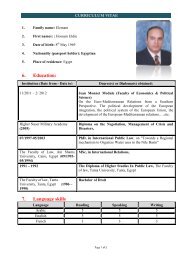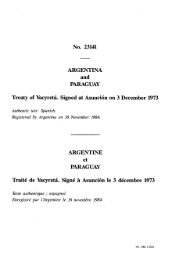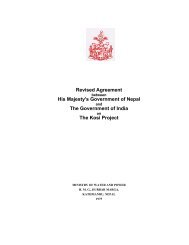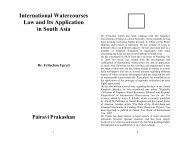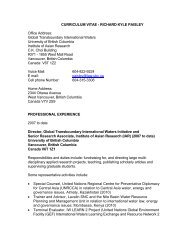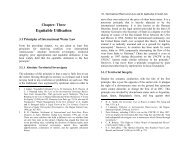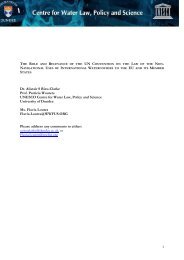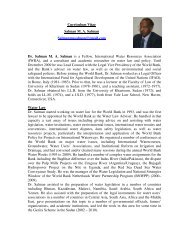Upreti, Trilochan, International Watercourses Law and Its Application ...
Upreti, Trilochan, International Watercourses Law and Its Application ...
Upreti, Trilochan, International Watercourses Law and Its Application ...
Create successful ePaper yourself
Turn your PDF publications into a flip-book with our unique Google optimized e-Paper software.
Equitable Utilisation / 137 138 / <strong>International</strong> <strong>Watercourses</strong> <strong>Law</strong> <strong>and</strong> <strong>Its</strong> <strong>Application</strong> in South Asiamaintained that the burden rests with the party seeking to relyon estoppel both with regard to the evidential burden <strong>and</strong> thatthe loss shows such facts. This was not demonstrated by theclaimant in the Tinoco claims case. 99Even in the absence of equity, detrimental reliance as a notionmay bar, under an implied principle of 'good faith', a party fromcontesting the legally binding effect of its terms of promise. Inthe Nuclear Test Case of 1974, Australia <strong>and</strong> New Zeal<strong>and</strong> v.France, the ICJ held that the French official announcement thatit would no longer undertake Nuclear tests after 1974 amountedto an obligation to act in good faith, conferring aninternationally binding character on a unilateral declaration. 100Successful invocation of equitable estoppel is tantamount toensuring that the applicant’s concerns are met <strong>and</strong> that theapprehended injury will be averted. There was nothing to provethat the French declaration would not be implemented, butnevertheless, the declaration led the other parties to believe thatFrance would refrain from carrying out further nuclear tests. Itis a wider principle of IWL that states are bound to accept thoseprinciples which have elsewhere been recognised by them. IfIndia has recognised that riparian neighbour cannot cause harmto her, she also cannot harm to her neighbours. For example,following India’s objection that East Pakistan’s reservoirproject on the far eastern border of Assam project wouldsubmerge its l<strong>and</strong>, the project was cancelled. 101 The reverseposition maintained by India in the construction of reservoirsthat have caused the inundation of Nepalese l<strong>and</strong> must bestopped under the principle of estoppel. If similar constructionshave been exists in Indo-Bhutan <strong>and</strong> Indo-Bangladesh bordersuch activities should be stopped.99 Ibid.100 ICJ Reports, (1994) pp. 110 & 118.101 Supra note 4, p. 311.3.6.3 AcquiescenceAcquiescence st<strong>and</strong>s out as another form of equitable estoppelrecognised as a general principle of law-as-fairness, in whichsilence or the absence of protest may preclude a state fromchallenging another state's claim. However, it must bementioned here that in order to succeed in a defence ofacquiescence, a state must prove that the second state hadknowledge of its claims. 102Use of acquiescence was made in the 1951 Anglo-NorwegianFisheries case between Norway <strong>and</strong> Britain. Norway had fordecades used a straight baseline to delimit its fisheries zone,rejecting the general practice of using a line based on thecoastal low water mark. The court favoured Norway’scontention <strong>and</strong> rejected Britain’s argument that it had notknown of this system of delimitation by Norway on the groundthat Britain, as a maritime power with a strong interest inNorwegian waters, must have known about the Norwegianpractice <strong>and</strong>, therefore, could not excuse itself for its failure toprotest on time. 103The Temple of Preah Vihear case followed the principle ofacquiescence, <strong>and</strong> in doing so, brought an equitable dimensionto the notion of finality. 104 The principle of equity precluded astate initiating a border dispute which had long been settled.The case relates to a border dispute between Thail<strong>and</strong> <strong>and</strong>Cambodia in which two Franco-Siamese Commissions over aperiod of sixty years delimited the frontier between FrenchIndo-China <strong>and</strong> Siam. After receiving appropriate maps, theThai Government registered no objection. The court held thatthe Siamese failure to object to the content of the maps102 Supra note 69, p. 568; also see I. C. Gibbon "The Scope ofAcquiescence in <strong>International</strong> <strong>Law</strong>" (1954) 31 BYIL, pp. 147-148.103 ICJ Reports, (1951) pp. 31-34.104 ICJ Reports, (1962) pp. 14-37.



